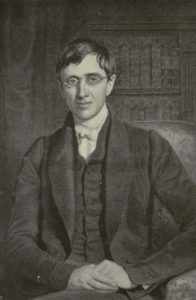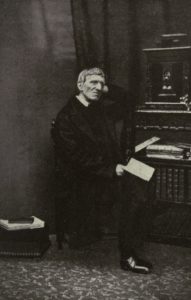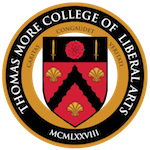 by Magdalena Dajka, ‘20
by Magdalena Dajka, ‘20
This Sunday, October 13, 2019, Blessed John Henry Newman will be canonized a saint in Rome. Thomas More College celebrates this occasion with great joy, because the college has many links, both intellectual and personal, to Newman.
John Henry Newman was born in 1801 in London, and died in 1890 at the Birmingham Oratory. After studying and becoming a fellow at Oxford, he was ordained an Anglican priest in 1825. In the next years, Newman and his friends started the Tractarian movement; in a series of “Tracts for the Times,” they argued for a more Catholic understanding of the Anglican church, an understanding that emphasized the importance of a fixed dogma. As Newman continued to read the Church Fathers, however, he began to have doubts that the Church of England was really in continuity with the Church of antiquity. He eventually gave up his posts as fellow of Oriel College, Oxford, and vicar of the University Church of St. Mary the Virgin, and retreated to his parish at Littlemore, a few miles outside Oxford, to live a life of study and prayer. There, on October 9, 1845, he was received into the Catholic Church.
Newman’s conversion had great effects on both Catholics and non-Catholics; it was the beginning of a stream of conversions and led to a greater acceptance of Catholics in England. Newman himself was soon ordained a priest of the Roman Catholic Church and established the Oratory of St. Philip Neri in Birmingham; in later years, he was made a cardinal. He also helped to found the Catholic University of Ireland in Dublin, which led to the publication of some of his most important ideas on education in The Idea of a University.
The college rejoices that its friend and intercessor in Heaven is about to join the ranks of the canonized saints, and takes the opportunity to reflect on Newman’s life as an example for our own lives.
In this work we can begin to trace Newman’s intellectual relationship to Thomas More College. As the college articulates it, the aim of Thomas More  College’s program of studies is “true enlargement of mind,” which Newman describes in The Idea of a University as a “power of viewing many things at once as one whole, of referring them severally to their true place in the universal system, of understanding their respective values, and determining their mutual dependence.” In addition, in his sermon, “Intellect, the Instrument of Religious Training,” Newman laments that too often in the world of education, “where power of intellect is, there need not be virtue; and that where right, and goodness, and moral greatness are, there need not be talent.” Thomas More College seeks to reunite those powers of intellect and of virtue, to form students in both intellectual and moral excellence.
College’s program of studies is “true enlargement of mind,” which Newman describes in The Idea of a University as a “power of viewing many things at once as one whole, of referring them severally to their true place in the universal system, of understanding their respective values, and determining their mutual dependence.” In addition, in his sermon, “Intellect, the Instrument of Religious Training,” Newman laments that too often in the world of education, “where power of intellect is, there need not be virtue; and that where right, and goodness, and moral greatness are, there need not be talent.” Thomas More College seeks to reunite those powers of intellect and of virtue, to form students in both intellectual and moral excellence.
The college also has many other ties to Newman. All students read his intellectual autobiography, Apologia Pro Vita Sua, in the spring semester of their junior year, as part of an examination of responses to the Enlightenment. Some students choose to focus on Newman for their Junior Projects and Senior Theses, with recent topics ranging from his Essay on the Development of Christian Doctrine, to his arguments against the rationalists, to his novel Callista. The Thomas More College Oxford Program, hosted by Second Spring Oxford, is a veritable Newman pilgrimage, as several students each summer learn about Newman’s life and thought, visit the places where he studied, taught, and preached, walk in his footsteps along the streets of Oxford and Littlemore, and even have the opportunity to pray on his own rosary.
And so, the college rejoices that its friend and intercessor in Heaven is about to join the ranks of the canonized saints, and takes the opportunity to reflect on Newman’s life as an example for our own lives. As President William Fahey notes, “John Henry Newman presents us with a wonderful example of conversion: here was a man for whom conversion offered no public advantage, who appeared to have more influence and status without  his conversion. His life—and his upcoming canonization—demonstrate the unforeseen and wonderful surprises uncovered by grace.”
his conversion. His life—and his upcoming canonization—demonstrate the unforeseen and wonderful surprises uncovered by grace.”
For further reading:
